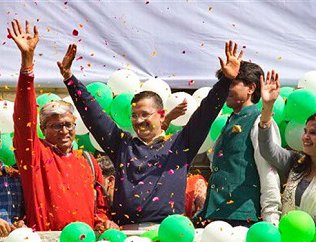
Two days before the Indian capital of Delhi went to the polls, President of the country's ruling Bharatiya Janata Party (BJP), Amit Shah claimed that the outcome of Delhi’s elections could not be considered as a referendum on Prime Minister Modi’s performance. Shah’s defensive approach gave hints that BJP, the star performer of the Lok Sabha elections nine months back and the party which had given the country a charismatic PM, had already, in a way, conceded defeat.
But Shah must not have expected the BJP to get such a beating even in his wildest dreams. The capital-based Aam Admi Party (AAP) swept the elections by a record margin leaving the national ruling party far behind. Commentators were quick in pointing out how the Modi magic had failed to weave the capital and how his honeymoon period had come to an end. So was the Delhi election actually a litmus test of Modi’s performance? The answer is no.
Firstly, the loss in Delhi should not come as a surprise as the capital has never really been a stronghold of the BJP. The only time the party won in the capital was during it’s first ever state elections in 1993. Widely known for having the middle class as its support base elsewhere in the country, Delhi’s middle class have mostly voted for the Congress in the past. When AAP emerged on the scene, it was Arvind Kejriwal who swayed their votes. Having won seven of Delhi’s seats in the Lok Sabha elections, the BJP did have expectations of receiving support from the middle class this time around. Even that did not happen as the support they had received nine months back was largely because of the anti- incumbency of the Congress and people’s anger against AAP. The BJP has always found itself struggling in the capital. This time it was no different. Modi or rather his nine month performance, thus, had nothing to do with the party’s debacle.
Although Modi extensively campaigned for the party in the capital, it was largely the faulty internal engineering that became a major reason for the loss. Party President Shah, otherwise known as a master strategist, went totally off the mark by selecting a political novice as the CM candidate. Not only was Kiran Bedi’s selection a blunder, it also intensified the already existing rift in the Delhi state unit of the party. Bedi ended up inflicting more damage rather than garnering votes. The gaffe was complemented by an equally erroneous election campaign which was completely negative in nature. Rather than touching upon core issues, leaders including Modi used the campaign to make scathing attacks against Kejriwal. It actually ended benefitting Kejriwal who began his campaign with an apology for his earlier stint and spoke only of core issues concerning the Delhiites. The AAP convener was also careful not in criticizing the PM, as he knew taking Modi head on would do no good. Instead the party started advocating that the country would function well if it had Modi as the PM and Kejriwal as the CM. AAP’s victory thus, became a result of lacklustre and panicky campaigning from BJP.
Riding high on its performance in Maharasthra, Haryana, Jammu & Kashmir and Jharkhand, many had expected the BJP to repeat the same in Delhi. But state elections tend to be heavily influenced by local issues and how the parties promise to address them. AAP’s election manifesto (despite questions on the achievability) spoke of how the party would solve pressing issues of water, electricity and women security. On the other hand, the BJP’s ‘vision document’ was rather vague and could not establish a connect with the people. This led the Delhiites to believe that AAP would do more efficiently in addressing the local issues.
The loss in Delhi is a big setback to the right wing party, no doubt. But as the BJP supremo said, the result in the national capital region (NCR) should not really be seen as a referendum on less than a year-old Modi government at the centre. What the party should realize that it’s aura of invincibility no longer remains.
- Ukrainian Crisis And The World (Dis)Order
- Apr 22, 2022
- China’s Cautious Steps In The Graveyard Of Empires
- Aug 18, 2021
- Foreign Aid On The Fence!
- Aug 08, 2021
- Communist Party of China centenary celebrations Reading between the lips
- Jul 14, 2021
- Second Wave Of Covid-19 In India: Deadly Blow To The Economy
- Jun 23, 2021
















